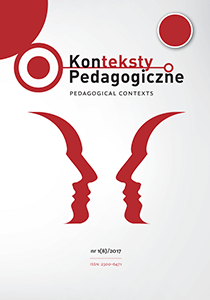Abstract
The common feature of modern information society and knowledge-based economy is the need to continuously acquire new knowledge as well as deepen the already possessed one in order to enhance self-development in the area of intellectual, social and moral competence. To develop and to do one’s tasks people should constantly learn and improve their skills and knowledge. This can be obtained in the course of self-education process. The self-education is an important aspect of the adolescence, when organized training gradually gives way to more independent intellectual activity, and the impact of education based on external motivation is increasingly replaced with voluntary and per-sonal work on one’s self. There is the important role of the teacher in inspiring self-study process of young people. Therefore, the modern teacher should have developed cognitive competence connected with different areas of knowledge.
References
Bardziejewska, M. (2005). Okres dorastania. Jak rozpoznać potencjał nastolatków? W: A.I. Brzezińska (red.), Psychologiczne portrety człowieka. Praktyczna psychologia rozwojowa. Gdańsk: Gdańskie Wydawnictwo Psychologiczne.
Bereźnicka, M. (2010). Wartości kształcenia we współczesnej szkole. Kraków: Wydaw-nictwo UP.
Bereźnicki, F. (2010). Uczenie się podstawą samokształcenia. W: J. Gabzdyl, B. Oelszlaeger (red.), Oblicza edukacji. Księga jubileuszowa dedykowana Profesorowi Wojciechowi Kojsowi. Sosnowiec: Humanitas.
Brzezińska, A.I. (2005). Jak skutecznie wspomagać rozwój? W: A.I. Brzezińska (red.),Psychologiczne portrety człowieka. Praktyczna psychologia rozwojowa. Gdańsk: Gdań-skie Wydawnictwo Psychologiczne.
Gołek, B., Wysocka, E. (2011). Kwestionariusz Nastawień Intrapersonalnych, Interpersonalnych i Nastawień wobec Świata (KNIIŚ). Podręcznik testu – wersja dla uczniów szkoły gimnazjalnej. Kraków: MEN–Krakowskie Towarzystwo Edukacyjne.
Korczyński, S. (1999). Obraz nauczyciela w polskiej myśli pedeutologicznej. Opole: Wy-dawnictwo Uniwersytetu Opolskiego.
Lawton, D., Gordon, P. (1993). Dictionary of Education. London: Hodder and Stoughton.
Matulka, Z. (1992). Samowychowanie. W: T. Wujek (red.), Wprowadzenie do pedagogiki dorosłych. Warszawa: PWN.
Matwijów, B. (1994). Samokształtowanie się człowieka w pedagogicznych koncepcjach XX wieku. Skrypty Uczelniane UJ, 707.
Moroz, H. (2005). Przygotowanie zawodowe nauczyciela. W: H. Moroz (red.), Rozwój zawodowy nauczyciela. Kraków: Impuls.
Pawlak, J. (2009). Autokreacja. Psychologiczna analiza zjawiska i jego znaczenie dla rozwoju człowieka. Kraków: WAM
Puślecki, W. (2002). Pełnomocni nauczyciele – pełnomocna szkoła. W: W. Kojs, E. Piotrowski, T.M. Zimny (red.), Edukacja jutra. VIII Tatrzańskie Seminarium Naukowe. Częstochowa: Menos.
In accordance with the recommendation of the Ministry of Science and Higher Education, which aims to counteract the practice of “ghostwriting” and “guest authorship,” all authors submitting their text for publication should attach an author’s statement which declares the contribution of each of the authors to the article. The printed and signed statement should be delivered by mail or other means to editor-in-chief Joanna Skibska or sent in the form of a scan to the following e-mail address: redakcja@kontekstypedagogczne.pl. The authors will not receive remuneration for publishing their papers. The editors reserve the right to make minor editorial changes to the articles which will not affect the substance of the article. We encourage all authors to prepare their articles in accordance with the guidelines for manuscript preparation. Download pdf file.
Authors transfer all copyrights and grant the journal the right of first publication with the work simultaneously licensed under a Creative Commons Attribution License that allows others to share the work with acknowledgement of the work's authorship and initial publication in this journal. All authors agree to the publishing of their email addresses, affiliations and short bio statements with their articles during the submission process.

